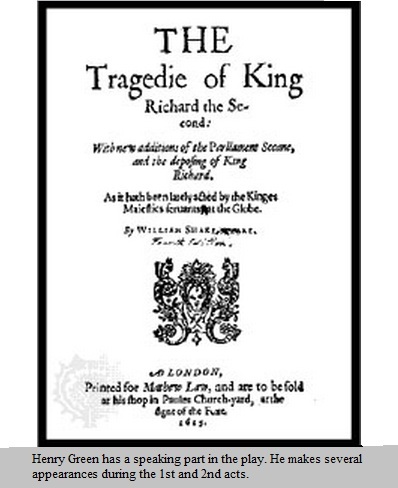
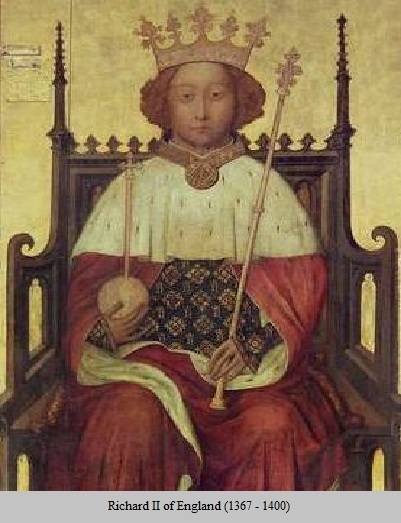
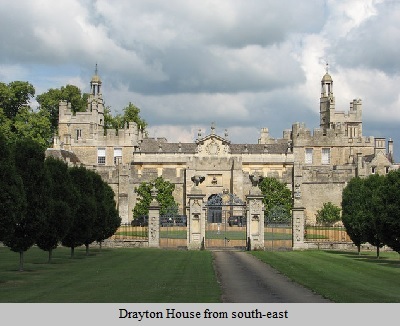
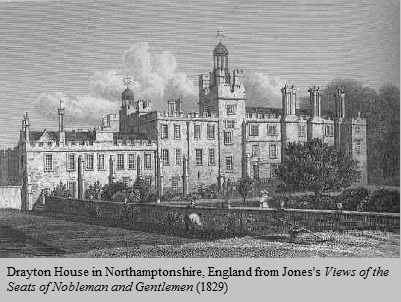
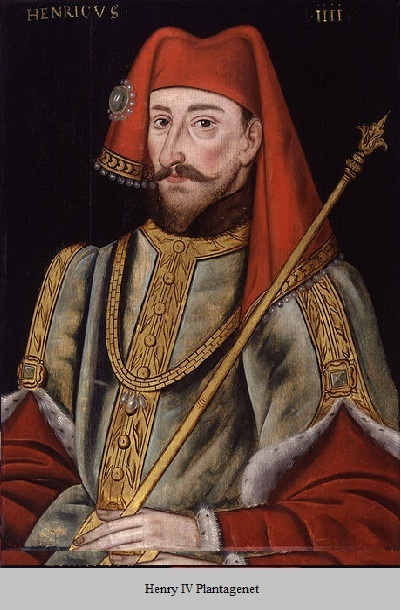
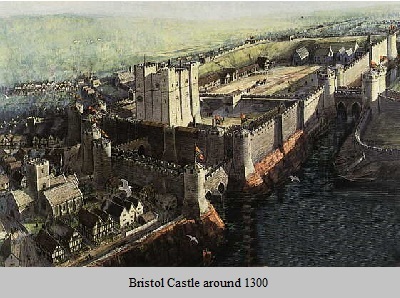

Henry and his wife Mathilda took up permanent residency at the fabulous Drayton House following their marriage. He inherited the stately manor and Greene’s Norton village from his father, Sir Henry Green, Lord of Boketon, KG. Henry the Elder bought Greene’s Norton (now called Greens Norton) for 20 shillings.
Originally built by the House of Vere, the vast estate surrounding the manor was granted to Alberic “The Monk” de Vere, father of Aubrey II de Vere, 1st Baron of Oxford (1062 – 1141), by William The Conqueror (1028 – 1087) after the Battle of Hastings. Drayton House was named after Sir Henry Drayton, who was born Henry de Vere around 1220. Simon de Drayton, his great-grandson, began building the core of the present-day structure of the manor in 1328. His only child, Katherine Drayton, married Sir Henry I de Greene (1310 – 1369). After his death, the estate was passed on to his son Sir Henry II de Greene.
Upon appointment by King Edward III, Henry the Elder served as Chief Justice of the King’s Bench from 24 May 1361 to 29 October 1365. He was stripped of office after becoming associated with a corruption scandal in 1365. Queen Catherine Parr, Henry VIII‘s last wife, was his 7th great-granddaughter.
Henry the Younger was a close confidante and counselor of King Richard II (1367 – 1400; agnatic descendant of Henry II Plantagenet (1133 – 1189) ) in matters of state. He was part of the triad, aptly named the three councilors, who were constantly at Richard’s side giving him advice. Tragically for them, they recommended that he confiscate the lands held by Henry Bolingbroke, Earl of Hereford, while he was in exile. Upon his return to reclaim his inheritance and his right to sit on the throne, the Earl, who was soon to become King Henry IV Lancaster, had the trio rounded up and brought to him at Bristol Castle on 23 July 1399. He beheaded them all the following day. Richard II died of starvation as a prisoner in the Tower of London six months later.
The three councilors make brief appearances (Acts I and II) and say a few lines in William Shakespeare’s (or Earl Edward de Vere‘s) play Richard II.
Continental Army Major General Nathanael Greene (1742 – 1786) was Henry’s agnatic descendant. Originally a militia private at the start of the Revolutionary War, he rapidly rose through the ranks to become one of General George Washington’s (1732 – 1799) most successful and trusted battlefield commanders.
Elizabethan dramatist Robert Greene may one day prove to have been a figment of Earl Edward de Vere’s prodigious literary imagination. There is evidence to the effect that Robert Greene was Oxford’s nom de plume for his prodigious literary output from 1580 to 1592. After creating Robert’s demise through a satirical pamphlet, Greene’s Groats-Worth of Wit, he adopted William Shake-speare as his successor nom de plume. The following passage of said pamphlet makes this claim evident:
Yes, trust them not for there is an upstart crow, beautified with our feathers, that with his tiger’s heart wrapped in a player’s hide, supposes he is as well able to bombast out a blank verse as the best of you, and being an absolute Johannes factotum, is in his conceit the only Shake-scene (later Shake-speare) a country.
“Johannes factotum” is Oxford’s coy way of telling posterity that William became his new literary servant after Robert’s death. He may well have been a flesh-and-blood servant of his much in the same way that William Shakespeare later served him. (One also suspects that the profile of the visage cloaked in a shroud as shown in the above woodcut is none other than Oxford’s.) Be that as it may, it’s interesting to observe that Oxford himself takes this occasion to sow the seeds of doubt concerning William Shakespeare’s authorship of the plays and sonnets he penned in his name to remain anonymous during his lifetime.
Robert’s rather plebeian family origins (both candidates as his father were tradesmen) cast grave doubt that he could have matriculated at Cambridge University (Oxford’s alma mater) in the first place, and later authored what at the time was exceptionally advanced literature, both stylistically and thematically.
Lord Boketon was an agnatic descendant of Conan Meriadoc ap Gereint (305 – 367) King of Dumnonia, 1st Duke of Brittany and Guéthénoc, 1st vicomte of Porhoët, Rohan and Guéméné (990 – 1040) .
Related ancestral blog articles
François de Rohan-Polduc (1725 – 1797) Grand Master of the Order of Malta
Henri II de Rohan (1579 – 1638) duc de Rohan, Huguenot Leader, Author
Sir Henry II de Greene, 7th Lord of Boketon
Birth 1352 in Norton, Northamptonshire, England
Death June 1399 in Beheaded at Bristol Castle by Henry IV
Ancestry.com citation/Lineages
7th cousin 20x removed LE ZOUCHE-ROHAN-LANDRY-BOURG-CYR-BRULE
8th cousin 19x removed VERE-DE CLARE-MARSHALL-WARREN-CARRINGTON-HOLLAND-SIMMONS-COLLINS
9th cousin 18x removed LE ZOUCHE-CANTILUPE-GOURNAY-WARREN-NORMANDY-PLANTAGENET-HOWARD-WOOD-COLLINS
8th cousin 21x removed DRAYTON-ARDERNE-BEAUCHAMP-VIVONIA-MARSHALL-POTTER-TRIPP-OUTWATER-COLLINS
7th cousin 22x removed DRAYTON-VERE-WARREN-HOLLAND-SIMMONS-COLLINS
husband of 9th cousin 16x removed MAUDUIT-ST LIZ-BEAUMONT-HOWARD-WOOD-COLLINS
husband of 10th cousin 18x removed MAUDUIT-DE LA MARE-D’AVRANCES-CARRINGTON-HOLLAND-SIMMONS-COLLINS
SOURCES
History of Parliament: Sir Henry Green
A Brief History of the Greene Family
The Greene family and its branches from A.D. 861 to A.D. 1904
The Oxford Authorship Site (Robert Greene as Oxford’s pen-name)
BIBLIOGRAPHY
The Plays & Poems of Robert Greene: Volume 2
The Poems of Robert Greene and Christopher Marlowe
Robert Greene, Elizabethan Dramatist
The Life and Complete Works in Prose and Verse of Robert Greene Volume 10
The Patricians, A Genealogical Study – Ebook Editions US$5.95


Steven Wood Collins (1952 – ) Antiquarian, Genealogist, Novel
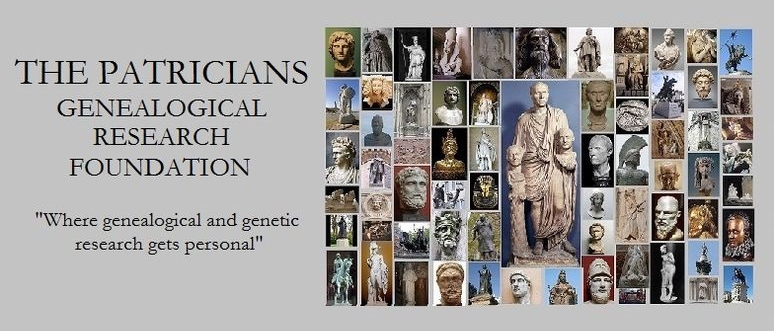

120 replies on “Sir Henry II de Greene, 7th Lord of Boketon (1353 – 1399) Courtier and Councillor of Richard II, Member of Parliament”
[…] Sir Henry II Greene, 7th Lord of Boketon (1353 – 1399) Member of Parliament 7-20 […]
LikeLike
[…] Sir Henry II Greene, 7th Lord of Boketon (1353 – 1399) Member of Parliament 7-20 […]
LikeLike
[…] Sir Henry II Greene, 7th Lord of Boketon (1353 – 1399) Member of Parliament 7-20 […]
LikeLike
[…] Sir Henry II Greene, 7th Lord of Boketon (1353 – 1399) Member of Parliament 7-20 […]
LikeLike
[…] Sir Henry II Greene, 7th Lord of Boketon (1353 – 1399) Member of Parliament 7-20 […]
LikeLike
[…] Sir Henry II Greene, 7th Lord of Boketon (1353 – 1399) Member of Parliament 7-20 […]
LikeLike
[…] Sir Henry II Greene, 7th Lord of Boketon (1353 – 1399) Member of Parliament 7-20 […]
LikeLike
[…] Sir Henry II Greene, 7th Lord of Boketon (1353 – 1399) Member of Parliament 7-20 […]
LikeLike
[…] Sir Henry II Greene, 7th Lord of Boketon (1353 – 1399) Member of Parliament 7-20 […]
LikeLike
[…] Sir Henry II Greene, 7th Lord of Boketon (1353 – 1399) Member of Parliament 7-20 […]
LikeLike
[…] Sir Henry II Greene, 7th Lord of Boketon (1353 – 1399) Member of Parliament 7-20 […]
LikeLike
[…] Sir Henry II Greene, 7th Lord of Boketon (1353 – 1399) Member of Parliament 7-20 […]
LikeLike
[…] Sir Henry II Greene, 7th Lord of Boketon (1353 – 1399) Member of Parliament 7-20 […]
LikeLike
[…] Sir Henry II Greene, 7th Lord of Boketon (1353 – 1399) Member of Parliament 7-20 […]
LikeLike
[…] Sir Henry II Greene, 7th Lord of Boketon (1353 – 1399) Member of Parliament 7-20 […]
LikeLike
[…] Sir Henry II Greene, 7th Lord of Boketon (1353 – 1399) Member of Parliament 7-20 […]
LikeLike
[…] Sir Henry II Greene, 7th Lord of Boketon (1353 – 1399) Member of Parliament 7-20 […]
LikeLike
[…] Sir Henry II Greene, 7th Lord of Boketon (1353 – 1399) Member of Parliament 7-20 […]
LikeLike
[…] Sir Henry II Greene, 7th Lord of Boketon (1353 – 1399) Member of Parliament 7-20 […]
LikeLike
[…] Sir Henry II Greene, 7th Lord of Boketon (1353 – 1399) Member of Parliament 7-20 […]
LikeLike
[…] Sir Henry II Greene, 7th Lord of Boketon (1353 – 1399) Member of Parliament 7-20 […]
LikeLike
[…] Sir Henry II Greene, 7th Lord of Boketon (1353 – 1399) Member of Parliament 7-20 […]
LikeLike
[…] Sir Henry II Greene, 7th Lord of Boketon (1353 – 1399) Member of Parliament 7-20 […]
LikeLike
[…] Sir Henry II Greene, 7th Lord of Boketon (1353 – 1399) Member of Parliament 7-20 […]
LikeLike
[…] Sir Henry II Greene, 7th Lord of Boketon (1353 – 1399) Member of Parliament 7-20 […]
LikeLike
[…] Sir Henry II Greene, 7th Lord of Boketon (1353 – 1399) Member of Parliament 7-20 […]
LikeLike
[…] Sir Henry II Greene, 7th Lord of Boketon (1353 – 1399) Member of Parliament 7-20 […]
LikeLike
[…] Sir Henry II Greene, 7th Lord of Boketon (1353 – 1399) Member of Parliament 7-20 […]
LikeLike
[…] Sir Henry II Greene, 7th Lord of Boketon (1353 – 1399) Member of Parliament 7-20 […]
LikeLike
[…] Sir Henry II Greene, 7th Lord of Boketon (1353 – 1399) Member of Parliament 7-20 […]
LikeLike
[…] Sir Henry II Greene, 7th Lord of Boketon (1353 – 1399) Member of Parliament 7-20 […]
LikeLike
[…] Sir Henry II Greene, 7th Lord of Boketon (1353 – 1399) Member of Parliament 7-20 […]
LikeLike
[…] Sir Henry II Greene, 7th Lord of Boketon (1353 – 1399) Member of Parliament 7-20 […]
LikeLike
[…] Sir Henry II Greene, 7th Lord of Boketon (1353 – 1399) Member of Parliament 7-20 […]
LikeLike
[…] Sir Henry II Greene, 7th Lord of Boketon (1353 – 1399) Member of Parliament 7-20 […]
LikeLike
[…] Sir Henry II Greene, 7th Lord of Boketon (1353 – 1399) Member of Parliament 7-20 […]
LikeLike
[…] Sir Henry II Greene, 7th Lord of Boketon (1353 – 1399) Member of Parliament 7-20 […]
LikeLike
[…] Sir Henry II Greene, 7th Lord of Boketon (1353 – 1399) Member of Parliament 7-20 […]
LikeLike
[…] Sir Henry II Greene, 7th Lord of Boketon (1353 – 1399) Member of Parliament 7-20 […]
LikeLike
[…] Sir Henry II Greene, 7th Lord of Boketon (1353 – 1399) Member of Parliament 7-20 […]
LikeLike
[…] Sir Henry II Greene, 7th Lord of Boketon (1353 – 1399) Member of Parliament 7-20 […]
LikeLike
[…] Sir Henry II Greene, 7th Lord of Boketon (1353 – 1399) Member of Parliament 7-20 […]
LikeLike
[…] Sir Henry II Greene, 7th Lord of Boketon (1353 – 1399) Member of Parliament 7-20 […]
LikeLike
[…] Sir Henry II Greene, 7th Lord of Boketon (1353 – 1399) Member of Parliament 7-20 […]
LikeLike
[…] Sir Henry II Greene, 7th Lord of Boketon (1353 – 1399) Member of Parliament 7-20 […]
LikeLike
[…] Sir Henry II Greene, 7th Lord of Boketon (1353 – 1399) Member of Parliament 7-20 […]
LikeLike
[…] Sir Henry II Greene, 7th Lord of Boketon (1353 – 1399) Member of Parliament 7-20 […]
LikeLike
[…] Sir Henry II Greene, 7th Lord of Boketon (1353 – 1399) Member of Parliament 7-20 […]
LikeLike
[…] Sir Henry II Greene, 7th Lord of Boketon (1353 – 1399) Member of Parliament 7-20 […]
LikeLike
[…] Sir Henry II Greene, 7th Lord of Boketon (1353 – 1399) Member of Parliament 7-20 […]
LikeLike
[…] Sir Henry II Greene, 7th Lord of Boketon (1353 – 1399) Member of Parliament 7-20 […]
LikeLike
[…] Sir Henry II Greene, 7th Lord of Boketon (1353 – 1399) Member of Parliament 7-20 […]
LikeLike
[…] Sir Henry II Greene, 7th Lord of Boketon (1353 – 1399) Member of Parliament 7-20 […]
LikeLike
[…] Sir Henry II Greene, 7th Lord of Boketon (1353 – 1399) Member of Parliament 7-20 […]
LikeLike
[…] Sir Henry II Greene, 7th Lord of Boketon (1353 – 1399) Member of Parliament 7-20 […]
LikeLike
[…] Sir Henry II Greene, 7th Lord of Boketon (1353 – 1399) Member of Parliament 7-20 […]
LikeLike
[…] Sir Henry II Greene, 7th Lord of Boketon (1353 – 1399) Member of Parliament 7-20 […]
LikeLike
[…] Sir Henry II Greene, 7th Lord of Boketon (1353 – 1399) Member of Parliament 7-20 […]
LikeLike
[…] Sir Henry II Greene, 7th Lord of Boketon (1353 – 1399) Member of Parliament 7-20 […]
LikeLike
[…] Sir Henry II Greene, 7th Lord of Boketon (1353 – 1399) Member of Parliament 7-20 […]
LikeLike
[…] Sir Henry II Greene, 7th Lord of Boketon (1353 – 1399) Member of Parliament 7-20 […]
LikeLike
[…] Sir Henry II Greene, 7th Lord of Boketon (1353 – 1399) Member of Parliament 7-20 […]
LikeLike
[…] Sir Henry II Greene, 7th Lord of Boketon (1353 – 1399) Member of Parliament 7-20 […]
LikeLike
[…] Sir Henry II Greene, 7th Lord of Boketon (1353 – 1399) Member of Parliament 7-20 […]
LikeLike
[…] Sir Henry II Greene, 7th Lord of Boketon (1353 – 1399) Member of Parliament 7-20 […]
LikeLike
[…] Sir Henry II Greene, 7th Lord of Boketon (1353 – 1399) Member of Parliament 7-20 […]
LikeLike
[…] Sir Henry II Greene, 7th Lord of Boketon (1353 – 1399) Member of Parliament 7-20 […]
LikeLike
[…] Sir Henry II Greene, 7th Lord of Boketon (1353 – 1399) Member of Parliament 7-20 […]
LikeLike
[…] Sir Henry II Greene, 7th Lord of Boketon (1353 – 1399) Member of Parliament 7-20 […]
LikeLike
[…] Sir Henry II Greene, 7th Lord of Boketon (1353 – 1399) Member of Parliament 7-20 […]
LikeLike
[…] Sir Henry II Greene, 7th Lord of Boketon (1353 – 1399) Member of Parliament 7-20 […]
LikeLike
[…] Sir Henry II Greene, 7th Lord of Boketon (1353 – 1399) Member of Parliament 7-20 […]
LikeLike
[…] Sir Henry II Greene, 7th Lord of Boketon (1353 – 1399) Member of Parliament 7-20 […]
LikeLike
[…] Sir Henry II Greene, 7th Lord of Boketon (1353 – 1399) Member of Parliament 7-20 […]
LikeLike
[…] Sir Henry II Greene, 7th Lord of Boketon (1353 – 1399) Member of Parliament 7-20 […]
LikeLike
[…] Sir Henry II Greene, 7th Lord of Boketon (1353 – 1399) Member of Parliament 7-20 […]
LikeLike
[…] Sir Henry II Greene, 7th Lord of Boketon (1353 – 1399) Member of Parliament 7-20 […]
LikeLike
[…] Sir Henry II Greene, 7th Lord of Boketon (1353 – 1399) Member of Parliament 7-20 […]
LikeLike
[…] Sir Henry II Greene, 7th Lord of Boketon (1353 – 1399) Member of Parliament 7-20 […]
LikeLike
[…] Sir Henry II Greene, 7th Lord of Boketon (1353 – 1399) Member of Parliament 7-20 […]
LikeLike
[…] Sir Henry II Greene, 7th Lord of Boketon (1353 – 1399) Member of Parliament 7-20 […]
LikeLike
[…] Sir Henry II Greene, 7th Lord of Boketon (1353 – 1399) Member of Parliament 7-20 […]
LikeLike
[…] Sir Henry II Greene, 7th Lord of Boketon (1353 – 1399) Member of Parliament 7-20 […]
LikeLike
[…] Sir Henry II Greene, 7th Lord of Boketon (1353 – 1399) Member of Parliament 7-20 […]
LikeLike
[…] Sir Henry II Greene, 7th Lord of Boketon (1353 – 1399) Member of Parliament 7-20 […]
LikeLike
[…] Sir Henry II Greene, 7th Lord of Boketon (1353 – 1399) Member of Parliament 7-20 […]
LikeLike
[…] Sir Henry II Greene, 7th Lord of Boketon (1353 – 1399) Member of Parliament 7-20 […]
LikeLike
[…] Sir Henry II Greene, 7th Lord of Boketon (1353 – 1399) Member of Parliament 7-20 […]
LikeLike
[…] Sir Henry II Greene, 7th Lord of Boketon (1353 – 1399) Member of Parliament 7-20 […]
LikeLike
[…] Sir Henry II Greene, 7th Lord of Boketon (1353 – 1399) Member of Parliament 7-20 […]
LikeLike
[…] Sir Henry II Greene, 7th Lord of Boketon (1353 – 1399) Member of Parliament 7-20 […]
LikeLike
[…] Sir Henry II Greene, 7th Lord of Boketon (1353 – 1399) Member of Parliament 7-20 […]
LikeLike
[…] Sir Henry II Greene, 7th Lord of Boketon (1353 – 1399) Member of Parliament 7-20 […]
LikeLike
[…] Sir Henry II Greene, 7th Lord of Boketon (1353 – 1399) Member of Parliament 7-20 […]
LikeLike
[…] Sir Henry II Greene, 7th Lord of Boketon (1353 – 1399) Member of Parliament 7-20 […]
LikeLike
[…] Sir Henry II Greene, 7th Lord of Boketon (1353 – 1399) Member of Parliament 7-20 […]
LikeLike
[…] Sir Henry II Greene, 7th Lord of Boketon (1353 – 1399) Member of Parliament 7-20 […]
LikeLike
[…] Sir Henry II Greene, 7th Lord of Boketon (1353 – 1399) Member of Parliament 7-20 […]
LikeLike
[…] Sir Henry II Greene, 7th Lord of Boketon (1353 – 1399) Member of Parliament 7-20 […]
LikeLike
[…] Sir Henry II Greene, 7th Lord of Boketon (1353 – 1399) Member of Parliament 7-20 […]
LikeLike
[…] Sir Henry II Greene, 7th Lord of Boketon (1353 – 1399) Member of Parliament 7-20 […]
LikeLike
[…] Sir Henry II Greene, 7th Lord of Boketon (1353 – 1399) Member of Parliament 7-20 […]
LikeLike
[…] Sir Henry II Greene, 7th Lord of Boketon (1353 – 1399) Member of Parliament 7-20 […]
LikeLike
[…] Sir Henry II Greene, 7th Lord of Boketon (1353 – 1399) Member of Parliament 7-20 […]
LikeLike
[…] Sir Henry II Greene, 7th Lord of Boketon (1353 – 1399) Member of Parliament 7-20 […]
LikeLike
[…] Sir Henry II Greene, 7th Lord of Boketon (1353 – 1399) Member of Parliament 7-20 […]
LikeLike
[…] Sir Henry II Greene, 7th Lord of Boketon (1353 – 1399) Member of Parliament 7-20 […]
LikeLike
[…] Sir Henry II Greene, 7th Lord of Boketon (1353 – 1399) Member of Parliament 7-20 […]
LikeLike
[…] Sir Henry II Greene, 7th Lord of Boketon (1353 – 1399) Member of Parliament 7-20 […]
LikeLike
[…] Sir Henry II Greene, 7th Lord of Boketon (1353 – 1399) Member of Parliament 7-20 […]
LikeLike
[…] Sir Henry II Greene, 7th Lord of Boketon (1353 – 1399) Member of Parliament 7-20 […]
LikeLike
[…] Sir Henry II Greene, 7th Lord of Boketon (1353 – 1399) Member of Parliament […]
LikeLike
[…] Sir Henry II Greene, 7th Lord of Boketon (1353 – 1399) Member of Parliament 7-20 […]
LikeLike
[…] Sir Henry II Greene, 7th Lord of Boketon (1353 – 1399) Member of Parliament […]
LikeLike
[…] Sir Henry II Green, 7th Lord of Boketon (1353 – 1399) Courtier and Councillor of Richard II, M… […]
LikeLike
[…] Sir Henry II Green, 7th Lord of Boketon (1353 – 1399) Member of Parliament 7-20 […]
LikeLike
[…] Sir Henry II Green, 7th Lord of Boketon (1353 – 1399) Courtier and Councillor of Richard II, M… […]
LikeLike
[…] Sir Henry II Green, 7th Lord of Boketon (1353 – 1399) Courtier and Councillor of Richard II, M… […]
LikeLike
[…] Sir Henry II Green, 7th Lord of Boketon (1353 – 1399) Courtier and Councillor of Richard II, M… […]
LikeLike
[…] Sir Henry II Green, 7th Lord of Boketon (1353 – 1399) Courtier and Councillor of Richard II, M… […]
LikeLike